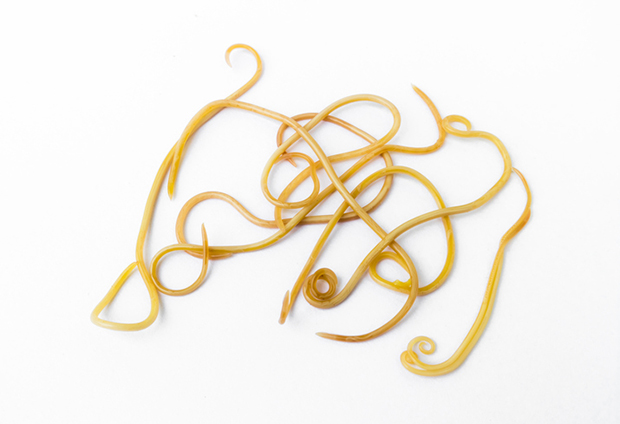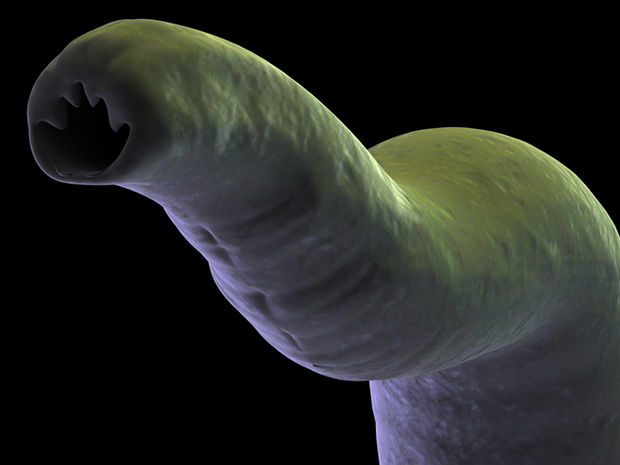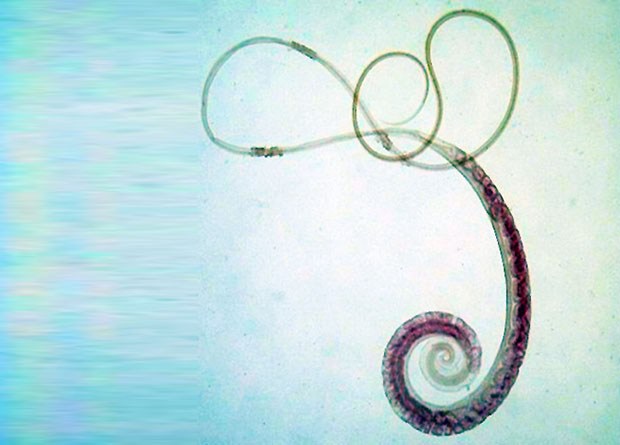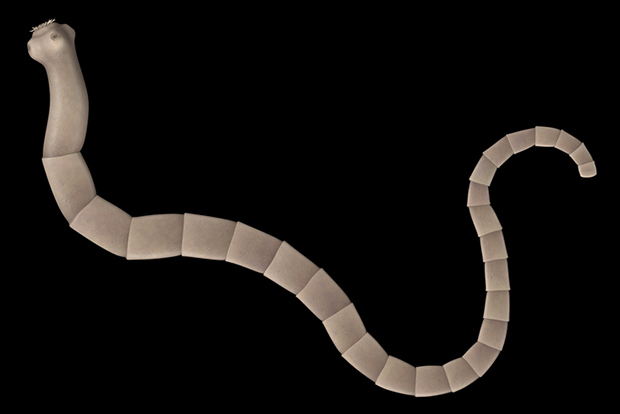Intestinal parasites are a threat to your pet. Worms in Bulldogs can be of different types and cause various health problems unless your dog is dewormed regularly. With adequate awareness, attention, and medication, you can prevent the severity of parasite infestation and keep him hale and hearty.

Types of Worms in Dogs
Worms in Bulldogs can be of the following five common types.
- Hookworms
- Roundworms
- Whipworms
- Tapeworms
- Heartworms
All except heartworms infest the digestive system. There are also non-worm parasites that can cause problems in your Bulldog’s digestive tract. These include the coccidia, the giardia, and the toxoplasma.
Transmission of Worms in Bulldogs
Intestinal parasites may enter your Bulldog in different ways. Here are the some of the most prevalent ways how these worms may become able to infest your pet.
By Birth
Puppies born to a mother not dewormed prior to mating are likely to be infected by intestinal worms. A mother dog carrying worms – especially roundworms – inside her body passes them on to her pups. The larvae transmit from the mother even when a dog is nursing her newly born puppies.
Ingesting Infected Objects
Dogs are notorious scavengers. They eat almost everything they put their noses on, and that includes fleas, infected objects, and even dead animals. These are likely to carry any of these parasites and transmit the same to your pet.
The Environment
When taking your Bulldog out for a daily walk, make sure to limit his exposure to things with the potential to infect your pet. Your dog is likely to be infested with intestinal parasites when he encounters worms, eggs, insects, and even animals already infected. Be careful, your Bulldog may swallow worm eggs that are often present in soil and other things he is frequently sniffing.
Mosquito Bites
Your Bulldog can get heartworms if he is bitten by a heartworm-carrying mosquito.
Worms in Bulldogs: An Overview
A variety of worms may affect your Bulldog and most of them dwell in the digestive tract. Different worms can leech on your pet’s health in different ways. Here is an overview of the most common types of worms in found in Bulldogs.
Roundworms
Roundworms are the most common type of worms found in dogs. The Toxascaris leonine and the Toxocaracanis are two species of roundworms that affect canines. Of the two, the latter can pose a more serious problem, as it grows up to several inches long and clogs up the intestine. Evidence suggests the transmission of Toxocaracanis to humans.

This type of worm feeds on the partially digested food inside the intestine. Cylindrical in shape and have a white to pinkish color, the parasite has three big lips. Roundworm eggs may be present in soil, grass, and dirt. Your Bulldog may also catch them after eating an infected animal or sniffing the infested soil. Puppies, on the other hand, can get roundworms from their mother.
Hookworms
Looking like small white threads and are much smaller than Roundworms, these are another common type of worms in dogs. Hookworms are named as such because they hook themselves to their host’s intestinal wall and suck blood. With sharp teeth, they can cause the host’s intestine to bleed. When this happens, the host suffers from blood loss and anemia.

The Ancylostoma braziliense, Ancylostoma caninum,and the Uncinaria stenocephala are the three species of hookworms that can affect Bulldogs. The Ancylostoma caninum and the Ancylostoma braziliense hookworms can affect humans too. The latter can even dig through the skin before getting into the bloodstream. Eventually, these worms may reach the trachea, lungs, and intestines.
Whipworms
The whipworm has a long neck attached to its short and fat body. It looks like a whip and hence, the name is whipworm. Whipworms commonly hide in the area where the large and the small intestines meet. They bury their long necks into the intestinal wall, causing bleeding.

AJC1/Flickr
Your Bulldog may catch this worm by ingesting eggs often found in the infected soil. He may also ingest worms shed by other animals in their residues. Although whipworms cause intestinal bleeding, they do not really lead to serious blood loss unless there is a severe infestation.
Tapeworms
Tapeworms look similar to flat rice-like segments making them easy to recognize. These worms also cause the least harm. Unlike other worms that have mouths, tapeworms have hooks and suckers on their heads. They use these physical features to hold onto the intestinal wall. They feed on your Bulldog’s ingested food by absorbing them through the skin.

There are many tapeworm species that can live and grow in your dog. One example is the Dipylidiumcaninum, a tapeworm that found in fleas. The species Taenia and Echinococcus are found in small rodents, such as mice, rats, gophers, and rabbits. These are also found in large animals, such as sheep and deer. Your Bulldog can catch tapeworms by eating infected fleas and meat of animals.
Heartworms
Heartworm infestation can be fatal. These parasites infest the heart and circulatory system of their hosts leading to breathing difficulties. When there is a severe infestation, heartworms can impact the normal functioning of the heart and even cause the death of your pet.
Your Bulldog can contact heartworms through the bites of infected mosquitoes, which carry these parasites after biting an already heartworm-positive dog.
Preventing Infestation of Worms in Bulldogs
You cannot 100% prevent your Bulldog from getting worms. However, you can avert severe parasite infestation that leads to serious health problems. The best way to do that is to follow your Bulldog’s deworming and heartworm preventative schedules. Veterinarians recommend deworming of dogs in every 3 months. There are also combination heartworm preventatives that target multiple parasites with one pop or application. Take your Bulldog to your vet to discuss the treatment plan that best suits him.
Signs of Worm Infestation in Dogs
Your dog is at the risk of severe infestation if you fail to follow deworming and heartworm preventative schedules with the right earnest. If your Bulldog has too many internal parasites, he may have the following signs.
- Coughing
- Vomiting that may come with worms
- Diarrhea that may or may not be bloody (Worms may also be present)
- Lethargy
- Enlarged tummy
- Weight loss
- Change in appetite
- Dull coat and itchy skin
- Scooting
If your Bulldog shows any of the said symptoms, schedule an appointment with the vet as soon as you can.
Treating Worms in Dogs
Veterinarians often suggest deworming medications for dogs with intestinal worms. They may also prescribe combinations of praziquantel, pyrantel pamoate, ivermectin, or milbemycin oxime. A follow up deworming session may be scheduled depending on the severity of the infestation.
If your Bulldog is showing other signs, including anemia, diarrhea, and lethargy, the vet may also recommend vitamin supplements and dextrose solution. An antibiotic called metronidazole may be given to your Bulldog when he has other parasites, such as giardia and coccidia.
The most common treatment used for heartworms is a combination of heartworm preventatives and immiticide injections. Intensive care is needed for dogs with heartworm infestation – especially Bulldogs since they are prone to respiratory and heart problems.
Preventing Worms in Bulldogs
Preventing worms in dogs is a lot easier and better than leaving it to the treatment. Just follow your Bulldog’s quarterly deworming schedule and monthly heartworm preventative schedule.
Combination heartworm preventatives are also effective against heartworm and other intestinal and external parasites. Talk to your veterinarian to know which combination heartworm preventative is better for your Bulldog.

